Diablo III was one of the most anticipated game releases in history, and as such, it had a lot to live up to. Diablo II players were famously devoted to the game and many eventually wound up selling gear on eBay and ultimately destroying the game’s native gold economy. To try and get a piece of this hot, hot action, Blizzard implemented the auction house in Diablo III (one that uses real money is still in the works) but has this ability to just go and buy things undermined the very addictive nature that made Diablo II such a hit? Alex Curelea seems to think so, and provides some good evidence to back it up. Still, I’m not sure I agree.
Curelea posted his thoughts on the subject on his blog, essentially positing that the auction house, which lets players pay for gear instead of grinding for it, dilutes the grind -> reward nature that Diablo II handled so well. Curelea compares the game play of Diablo II to an experiment. It’s basically Pavlov’s dog, you know, the one where bell dings, you put food in front of a dog and he starts to salivate. Do this enough times, and the dog will start to salivate involuntarily when the bell rings, because it knows the food is coming. The experiment Curelea uses is essentially the same thing, though it involves a monkey and actually performing the activity that kicks off the reward. Imagine if Pavlov’s dog could ring the bell.
Anyway, Curelea’s argument goes that the inclusion of the auction house led to a modification in the chances for the randomized drop, that these changes make really good rewards less rare, that players are then driven to the auction house, and that this dilutes the grind-yields-reward relationship that Diabl0 II was built around. The overarching point he arrives at is that Diablo III is necessarily less addictive as a result.
It’s an interesting point, and not necessarily wrong, but I think there’s a few variables he ignored. Mainly, this argument that Diablo III is less addictive may hold true, but only to people who were planning to play Diablo III in the same way (and as much) as they played Diablo II. To clarify, a non-sensitive gamer — one who will grind and grind and grind as long as it takes — is going to get less payoff going to buy an item they need from the auction house than they would have grinding for it in the wild. A sensitive gamer, on the other hand — one who’s just going to stop playing if they were going to have to grind for an hour — is going to get much more play out of Diablo III than they would have otherwise. In a certain respect, this makes the game more “addictive” for some gamers, at the very least “more playable.”
In any event, it’s definitely an interesting question to think about, especially since the psychology behind “press a button and then feel good as a result” has a very close relationship to fun video games, loot grinds in particular. It’s interesting to think about, but sort of dangerous in the same sense, since there’s nothing worse than that shining moment of clarity where you depressingly realize “Oh wait, this is only a game.” It’ll be interesting to see how things play out when the real money auction house gets rolling. Until then, it’s click click click and whether it’s in-game or in the auction house, isn’t that what Diablo is really about?
You can read Curelea’s full reasoning on why Diablo III is less addictive over at his blog. You should. It’s interesting.
(h/t Hacker News)
- People were beating Diablo III in a matter of hours
- How to get to Whimsyshire
- A run-down of Diablo lore








Published: Jun 5, 2012 08:00 pm